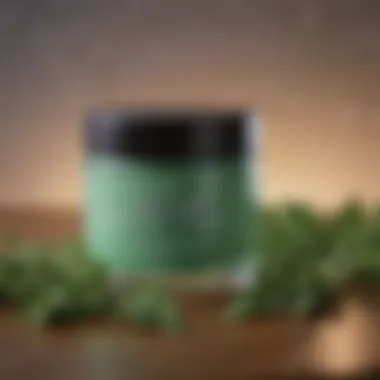Comprehensive Guide: How to Clear Body Acne Effectively


Trend Report
Style Guides
Within the realm of body acne management, the focus on wardrobe essentials extends beyond fashion statements to encompass breathable clothing fabrics that facilitate skin health. Styling tips for individuals dealing with body acne can revolve around loose-fitting attire to prevent skin irritation and aid airflow. Guides tailored to different body shapes can provide valuable pointers on selecting clothing that minimizes acne-prone areas or offers coverage where needed, promoting both style and skin comfort.
Beauty Tips & Hacks
Navigating body acne requires an understanding of effective makeup techniques that do not exacerbate existing breakouts. Step-by-step tutorials on concealing body acne with makeup can empower individuals to feel confident while managing skin concerns. Skincare routines specific to body acne may involve gentle exfoliation and targeted treatments to address inflammation and breakouts. DIY beauty hacks focusing on natural ingredients can offer alternative solutions for soothing irritated skin and promoting healing.
Product Reviews
When selecting skincare products for body acne, honest reviews play a crucial role in guiding consumer choices. In-depth evaluations of acne-fighting formulations can assist individuals in determining the most suitable options for their skin type and concerns. Personal testimonials on tried-and-tested products provide firsthand insights into the efficacy and compatibility of various brands, aiding in informed decision-making.
Celebrity Fashion & Beauty
Drawing inspiration from red carpet looks can spark creativity in styling outfits that complement body acne management. Analyzing celebrity style icons who have openly discussed their skincare struggles can offer reassurance and motivation to individuals dealing with similar concerns. Insider beauty secrets shared by celebrities can introduce innovative approaches to skincare routines that prioritize skin health and overall well-being.
Understanding Body Acne
In this segment of the article, we delve into the crucial topic of understanding body acne. An essential aspect when aiming to clear acne, comprehending body acne allows us to address the issue effectively. By understanding the root causes and characteristics of body acne, individuals can tailor their approach to combatting this common skin concern. This section serves as the foundational knowledge base for the subsequent discussions on preventive measures, treatments, lifestyle changes, and skincare tips related to body acne.
What is Body Acne?
Definition of Body Acne
Body acne, also known as bacne, refers to the development of acne on areas other than the face, such as the back, chest, and shoulders. The presence of clogged pores, excess oil production, and bacterial growth contribute to the formation of body acne. Understanding the definition of body acne helps individuals differentiate it from facial acne, as the treatment methods and preventive measures may vary. By highlighting the distinct characteristics of body acne, individuals can tailor their skincare routine to effectively address this specific type of acne, marking the significance of this discussion in our comprehensive guide.
Types of Body Acne
When exploring body acne, it is essential to note the different types that individuals may experience. These include comedones, papules, pustules, nodules, and cysts, each presenting its unique challenges and treatment requirements. By discussing the types of body acne, individuals can identify their specific acne manifestations and select appropriate treatment approaches. Recognizing the diversity of body acne types enhances the ability to address various skin concerns comprehensively, underscoring the importance of this section in our guide.
Causes of Body Acne
Body acne can stem from a variety of factors, making it crucial to understand the underlying causes to effectively manage and clear the skin condition. One significant factor contributing to body acne is hormonal fluctuations, particularly during puberty or menstrual cycles. Hormonal imbalances can lead to increased sebum production and pore blockages, exacerbating acne development. Exploring the role of hormonal factors sheds light on why body acne occurs and how individuals can mitigate its impact through targeted interventions.
Genetics also play a role in predisposing individuals to acne, including body acne. Familial tendencies towards acne can influence one's susceptibility to developing skin issues, highlighting the genetic component in understanding and managing body acne. By discussing the influence of genetics on acne, readers can discern how hereditary factors may contribute to their skin condition, guiding them towards tailored solutions for clearer skin.


Dietary influences have been increasingly recognized as a factor affecting skin health, including the development of acne. Consuming a diet high in refined sugars, dairy products, or processed foods can trigger acne flare-ups due to their impact on hormonal balance and inflammation. Examining the link between diet and body acne emphasizes the importance of nutrition in promoting skin clarity and suggests dietary modifications to support acne management efforts.
Preventive Measures
Acne on the body can be a persistent issue for many individuals, and adopting preventive measures is crucial in combating this concern effectively. By focusing on preventive measures, individuals can proactively address the root causes of body acne, leading to clearer and healthier skin. In this section, we will delve into key elements such as maintaining proper hygiene, making wise dietary choices, and selecting suitable clothing to prevent and manage body acne.
Maintaining Proper Hygiene
Showering Regularly
Showering regularly plays a vital role in preventing body acne as it helps to remove dirt, oil, and sweat from the skin's surface. The key characteristic of showering regularly lies in its ability to cleanse the skin and unclog pores, reducing the risk of acne breakouts. By incorporating regular showers into your routine, you can maintain optimal skin hygiene and minimize the accumulation of acne-causing impurities. However, excessive showering may strip the skin of its natural oils, leading to dryness and potential irritation, so finding a balance is essential for achieving clear skin.
Using Non-comedogenic Products
Utilizing non-comedogenic products is another essential aspect of maintaining proper hygiene to prevent body acne. Non-comedogenic products are formulated to avoid clogging pores, reducing the likelihood of acne development. The key characteristic of non-comedogenic products is their non-pore-blocking nature, making them a preferred choice for individuals prone to acne. By choosing non-comedogenic skincare and cosmetic items, you can minimize pore blockages, inflammation, and breakouts, promoting healthier and clearer skin. It is important to note that each person's skin reacts differently to products, so testing a new product on a small area before full application is recommended.
Dietary Considerations
Effects of Diet on Acne
The effects of diet on acne have been a topic of interest in recent years, with studies suggesting a correlation between certain foods and acne severity. Understanding the impact of diet on acne is crucial in formulating an effective preventive strategy. Consuming a balanced diet rich in fruits, vegetables, and lean proteins can support overall skin health and reduce inflammation associated with acne. The key characteristic of a skin-friendly diet lies in its ability to provide essential nutrients and antioxidants that aid in skin repair and renewal, potentially decreasing acne occurrences. While more research is needed to establish concrete dietary guidelines for acne prevention, making nutritious food choices can contribute to clearer and radiant skin.
Foods to Avoid for Clear Skin
Certain foods are commonly known to exacerbate acne symptoms and should be avoided for clearer skin. The consumption of high glycemic index foods, dairy products, and foods with excessive sugar or trans fats can potentially trigger acne flare-ups. The key characteristic of foods to avoid for clear skin is their potential to disrupt hormonal balance, increase inflammation, and contribute to sebum production, all of which are factors linked to acne development. By minimizing the intake of these problematic foods and opting for skin-friendly alternatives, individuals can support their skin's health and reduce the likelihood of experiencing acne breakouts.
Clothing Choices
Breathable Fabrics
Choosing breathable fabrics for clothing is imperative in preventing body acne as it allows the skin to breathe and minimizes sweat and oil accumulation. The key characteristic of breathable fabrics lies in their capacity to promote air circulation, preventing moisture buildup and bacterial growth that can exacerbate acne. Opting for materials like cotton, linen, or bamboo can help maintain skin integrity, reducing the risk of skin irritation and inflammation. However, it is essential to consider individual sensitivities and preferences when selecting breathable fabrics to ensure comfort and efficacy in preventing body acne.
Loose-fitting Clothing
Wearing loose-fitting clothing is beneficial in preventing body acne by reducing friction, sweat retention, and pore occlusion. The key characteristic of loose-fitting clothing is its ability to provide ample air circulation and minimize skin contact, preventing heat and moisture buildup that can contribute to acne formation. Loose-fitting garments, such as flowy tops and breathable bottoms, create a less restrictive environment for the skin, reducing the likelihood of skin irritation and breakouts. While style preferences may vary, prioritizing loose and comfortable apparel can positively impact skin health and help prevent the onset of body acne.
Effective Treatments


In the journey to conquer body acne, effective treatments play a crucial role. These treatments are the cornerstone of combating acne and achieving clear, healthy skin. By targeting the root causes of acne, effective treatments provide a proactive approach to managing breakouts and preventing future flare-ups. Understanding the specific elements and benefits of these treatments is essential for a comprehensive guide on clearing body acne, ensuring readers have the knowledge needed to make informed decisions regarding their skincare routines.
Topical Treatments
Salicylic Acid
Salicylic Acid stands out as a prominent ingredient in acne-fighting skincare products. Its primary function lies in its ability to exfoliate and unclog pores, effectively combating acne at its source. The key characteristic of Salicylic Acid is its gentle yet effective nature, making it suitable for various skin types, including sensitive skin. Being a popular choice in addressing body acne, Salicylic Acid helps to reduce oiliness, inflammation, and acne lesions. Despite its effectiveness, some individuals may experience dryness or irritation as potential disadvantages, highlighting the importance of proper use and moisturization in conjunction with this treatment.
Benzoyl Peroxide
Another key player in the realm of acne treatment is Benzoyl Peroxide. Known for its antibacterial properties, Benzoyl Peroxide effectively targets and eliminates P. acnes bacteria, a significant contributor to acne development. The key characteristic of Benzoyl Peroxide is its ability to reduce inflammation and prevent new breakouts, making it a beneficial choice for individuals struggling with body acne. While Benzoyl Peroxide can be highly effective in treating acne, some users may experience dryness, redness, or peeling as potential drawbacks. Proper usage and hydration are essential to mitigate these side effects.
Retinoids
Retinoids represent a potent class of skincare ingredients that contribute significantly to acne treatment. These compounds work by promoting cell turnover, preventing clogged pores, and reducing inflammation, ultimately leading to clearer, smoother skin. The key characteristic of Retinoids is their ability to address various skin concerns beyond acne, including fine lines and uneven skin tone, offering a holistic approach to skincare. While Retinoids provide numerous benefits, such as improving skin texture and tone, they may cause dryness, irritation, or increased sensitivity to sunlight. Sunscreen usage is crucial when incorporating Retinoids into a skincare regimen to protect the skin from potential harm.
Professional Procedures
Chemical Peels
Among the array of professional procedures available for managing body acne, Chemical Peels offer a targeted solution for acne-prone skin. These peels work by exfoliating the outer layer of the skin, unclogging pores, and promoting cell renewal, resulting in clearer and revitalized skin. The key characteristic of Chemical Peels is their ability to address both active acne breakouts and acne scarring, making them a versatile option for individuals seeking smoother, blemish-free skin. While Chemical Peels can deliver transformative results, individuals with sensitive skin may experience redness, mild tingling, or temporary dryness post-treatment. Adhering to post-peel care instructions and staying hydrated are essential for optimal recovery and skin health.
Microdermabrasion
Microdermabrasion stands out as a non-invasive procedure that offers significant benefits for individuals struggling with body acne. This procedure involves exfoliating the skin to remove dead skin cells, unclog pores, and stimulate collagen production, resulting in improved skin texture and tone. The key characteristic of Microdermabrasion is its ability to enhance skincare product absorption, allowing for better penetration of acne-fighting ingredients for optimal results. While Microdermabrasion is safe for most skin types and concerns, individuals with severe active acne or sensitive skin may experience mild redness or temporary sensitivity post-treatment. Following post-treatment skincare recommendations and avoiding direct sun exposure are critical for maintaining skin health and maximizing the benefits of Microdermabrasion.
Laser Therapy
Laser Therapy represents an advanced solution in the realm of professional acne treatments, offering targeted and precise results for individuals struggling with body acne. This therapy works by using specific wavelengths of light to target acne-causing bacteria, reduce inflammation, and prevent future breakouts. The key characteristic of Laser Therapy is its ability to deliver significant improvements in acne severity and skin texture, making it a sought-after option for individuals seeking comprehensive acne management. While Laser Therapy is generally well-tolerated, individuals may experience temporary redness, mild discomfort, or sun sensitivity post-treatment. Adhering to post-therapy recommendations, such as applying soothing skincare products and wearing sunscreen, is essential for optimizing results and ensuring skin health.
Lifestyle Changes and Skincare Tips
In discussing comprehensive strategies to clear body acne, lifestyle changes play a pivotal role in maintaining healthy skin. The significance of lifestyle modifications cannot be overstated when aiming for clear and radiant skin. Addressing habits and routines that may exacerbate acne is crucial. By incorporating a balanced diet, regular exercise regime, and stress management techniques, individuals can effectively combat body acne. Additionally, adhering to a consistent skincare routine tailored to one's skin type is essential for long-term skin health and acne prevention.
Stress Management
Impact of Stress on Acne:


delving into the intricate relationship between stress and acne reveals a compelling narrative. The impact of stress on the skin is profound, often manifesting in the form of breakouts and exacerbating existing acne conditions. High levels of stress can trigger hormonal imbalances, leading to increased sebum production and inflammation, ultimately contributing to the development of acne. Understanding how stress influences acne can empower individuals to implement effective stress management strategies to mitigate its negative effects on the skin.
Relaxation Techniques:
Exploring various relaxation techniques unveils a treasure trove of tools to combat stress and promote skin health. From mindfulness meditation to deep breathing exercises, incorporating relaxation practices into daily routines can significantly reduce stress levels and alleviate acne symptoms. Relaxation techniques not only improve overall well-being but also aid in stabilizing hormone levels, thereby reducing the likelihood of acne flare-ups. Embracing these techniques as part of a holistic approach to skincare can yield lasting benefits for individuals seeking clear and blemish-free skin.
Daily Skincare Routine
Gentle Cleansing:
delving deep into the realm of skincare routines, the role of gentle cleansing stands out as a cornerstone of effective skincare practices. Gentle cleansing helps remove impurities, excess oil, and debris from the skin's surface without causing irritation or disruption to the skin barrier. By using mild, non-abrasive cleansers suited to one's skin type, individuals can maintain clean and clear skin while minimizing the risk of acne breakouts. Incorporating gentle cleansing into a daily skincare regimen ensures that the skin remains balanced, rejuvenated, and free from blemishes.
Moisturizing:
Unveiling the benefits of moisturizing reveals its indispensable nature in nurturing healthy skin. Moisturizers help hydrate the skin, maintain its natural moisture barrier, and prevent excessive dryness or oiliness. By choosing lightweight, non-comedogenic formulas, individuals can effectively moisturize their skin without clogging pores or exacerbating acne. Regular moisturization not only promotes skin elasticity and radiance but also aids in soothing inflammation and reducing redness associated with acne-prone skin.
Sun Protection:
Exploring the realm of sun protection underscores its paramount importance in safeguarding the skin against harmful UV rays. Sun protection is critical in preventing premature aging, sunburn, and skin damage that can exacerbate acne symptoms. By using broad-spectrum sunscreen daily and seeking shade during peak sun hours, individuals can shield their skin from UV-induced damage while preserving its health and vitality. Prioritizing sun protection as a non-negotiable aspect of skincare routines is essential for combating acne and maintaining radiant, youthful skin.
Consulting a Dermatologist
Consulting a Dermatologist is a crucial aspect of effectively addressing body acne. Professional guidance from a dermatologist can provide valuable insights and personalized treatment plans tailored to individual skin needs. Dermatologists are trained experts in diagnosing and treating various skin conditions, including stubborn cases of body acne that may not respond to over-the-counter remedies. Seeking professional help is particularly recommended for individuals with persistent acne or severe breakouts that do not improve with conventional skincare routines. Dermatologists can recommend suitable medications, procedures, or lifestyle changes to help manage and clear body acne effectively.
When to Seek Professional Help
Persistent Acne
Persistent acne refers to stubborn, long-lasting acne that persists despite regular skincare efforts. This type of acne often requires specialized treatment approaches beyond standard topical products. Dermatologists play a crucial role in evaluating the underlying causes of persistent acne, which may include hormonal imbalances, genetic predispositions, or other systemic factors. By addressing these root causes with targeted therapies, dermatologists can help patients achieve clearer skin and prevent future breakouts.
Severe Breakouts
Severe breakouts signify acute flare-ups of inflammatory acne lesions, such as nodules, cysts, or pustules. These lesions are deeper within the skin layers and can cause pain, scarring, and emotional distress. Dermatologists can provide effective treatments for severe breakouts, including prescription medications like oral antibiotics, isotretinoin, or hormonal therapies. For severe cases, in-office procedures such as corticosteroid injections, drainage of cysts, or laser therapy may be recommended to expedite healing and reduce scarring.
Treatment Options
Prescription Medications
Prescription medications are potent acne treatments prescribed by dermatologists for moderate to severe cases. These medications contain active ingredients like antibiotics, retinoids, or oral contraceptives that target acne-causing bacteria, regulate skin cell turnover, and manage hormonal influences on acne development. While effective, prescription medications may have side effects like dryness, irritation, or increased sun sensitivity, requiring close monitoring by a dermatologist throughout the treatment period.
In-office Procedures
In-office procedures offer advanced solutions for persistent or severe body acne resistant to conventional treatments. Dermatologists perform procedures like chemical peels, microdermabrasion, or laser therapy to target acne lesions, reduce inflammation, and improve overall skin texture. These procedures typically require multiple sessions for optimal results and may involve temporary redness, peeling, or mild discomfort afterward. However, they represent valuable options for individuals seeking faster and more intensive acne clearance under professional supervision.



